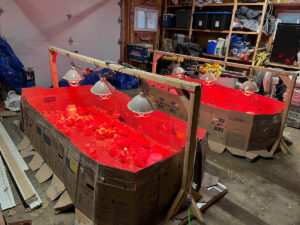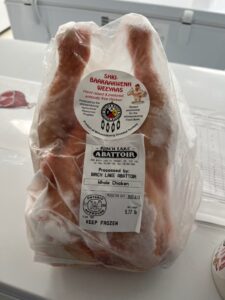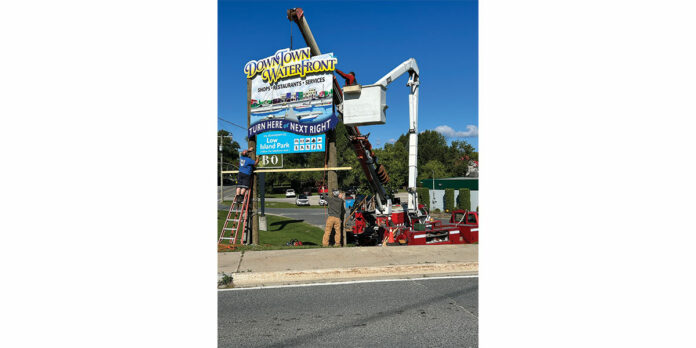WIIKWEMKOONG—Wiikwemkoong Agricultural Resources is taking on the challenge of food security with a wide range of programs and projects, one of the latest being the production of artisanal chickens. The organization is taking part in the Artisanal Chicken Program, administered by the Chicken Farmers of Ontario.
“The Agricultural Resources program has been approved for an artisanal chicken licence and can now raise up to 2,000 birds,” confirmed Annette Peltier-Flamand. “We started out this year with 675 birds and are working our way up to a higher volume. All of the birds we raise will benefit the Wiikwemkoong Food Bank.”
The Artisanal Chicken Program provides opportunities for small, independent, locally based farmers to meet local demands for safe high-quality chicken. Under provisions of the program, farms can grow between 600 and 3,000 chickens each year.
The program started out small, with only 225 birds, rustic ranger breed, with the aim of managed growth. “The first year we started with 225 birds, this year it was 675 and next year we will go bigger,” confirmed Ms. Peltier-Flamand. “We learned a lot of things along the way and we are kind of glad we started out small.”
Once the birds are raised, they are shipped in crates by truck to Birch Lake Abattoir in Massey. That was a lesson in itself. Apparently, it is easy for the birds to suffocate when they pile up together, or when they are in transit. “We started with 225, we shipped 211, three were rejected at the plant, so we wound up with 208,” said Ms. Peltier-Flamand.

“Ken Lewis built a custom brooder for the project,” she said. “It has a big light and gets covered at night.”
The project also started out with a pair of chicken tractors, large movable cages that allow the birds to be moved to new pastures without danger of them escaping into the wild or attacked by predators while they forage for bugs and seeds on the ground. “Now we have four,” said Ms. Peltier-Flamand. “We can spread them out more now.”
The project only raises chickens in the warmer months, taking the baby chicks to adult size in 12 weeks. “In November we stop accepting chicks.”
The project even has its own label, proudly proclaiming “Shki-baakaakwenh Weeyaas” or “Hand raised and pastured antibiotic free chicken,” and “a product of Wiikwemkoong Unceded Territory.”
The project is now supplying an important meat option for the Wiikwemkoong Food Bank, but the chickens are by no means the only food security avenue that Wiikwemkoong Agricultural Resources is undertaking. From vast community gardens to a herd of cattle, the aim is set square on providing secure food resources to the community.
The fragility of the food supply chain that was brought home during the pandemic is only adding impetus to the band’s focus on securing those resources in the future.
Fundraising efforts are underway to secure the monies needed to put in place the infrastructure needed to comply with the Artisanal Chicken Program requirements. Ms. Peltier-Flamand estimates that the program will require between $150,000 and $200,000 to have everything in place. “Once we have the infrastructure in place, it’s not going to cost much at all, as all we will basically be doing is paying for the chicks, the feed and the abattoir expenses.”
In addition to supplying safe and secure food sources for the community, the program also provides employment opportunities in the community, noted Ms. Peltier-Flamand. The program also trains and educates community members and summer students in the care and raising of chickens.
Ms. Peltier-Flamand expressed gratitude to the volunteers and students and praised their commitment and dedication to care for the birds. “The students are learning about responsibility and for many, this is their first experience with agriculture.”






